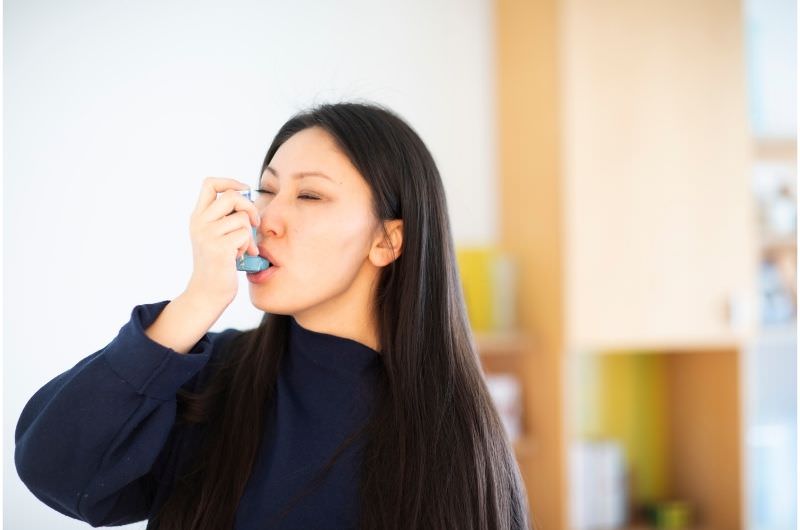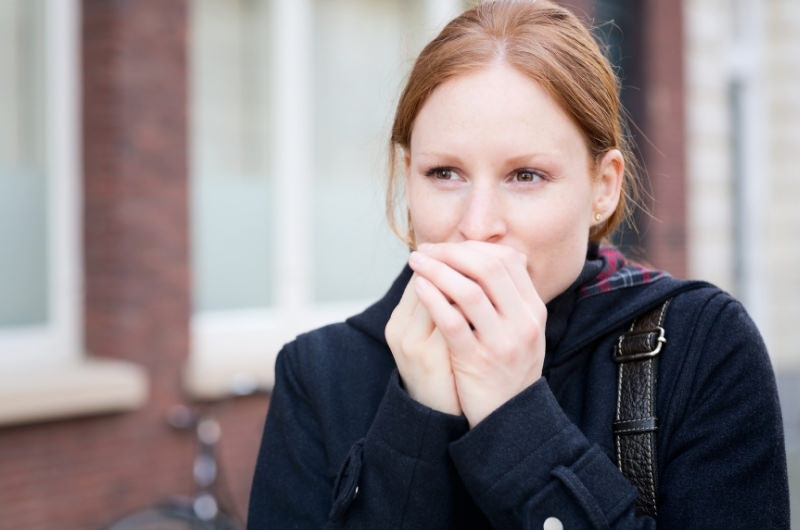You guessed it! The main culprit will always be cold weather. While it is not something to worry about, you may need to be aware of excessively cold climates. The dryness of the cold air can irritate your mucous membrane, eventually causing an asthmatic cold. The cold feeling in your airways can also be a symptom of diseases such as thyroid issues and even mental strain. You can follow simple home remedies to make sure you don’t have to go through the discomfort of this feeling by covering yourself and staying hydrated. In case you were wondering, it’s unlikely that this could be a symptom of Covid-19.
We all know that the nose plays its role in breathing in the air that keeps us alive.
But what most of us may not know is that your nose also regulates the temperature of your breath by bringing it closer to your body temperature, which in turn is better accepted by your tissues.
Warming the cool atmospheric air is a much more common function than cooling warm air, which is why if you’re feeling like you’re breathing in cold air, something might be off.
Who is the main culprit of this cold air sensation? What are cold-air-induced asthma and its symptoms?
Can cool air passing through your nose signify a disease? What tips can you follow to evade shortness of breath in hot and cold weather? Can this feeling be a symptom of Covid 19?
What makes my breath feel cold?
The first thing you need to know is that your nose is made of mostly cartilage tissue surrounded by a rather thin layer of skin and an even thinner layer of insulating fat.

Because of this, the outside temperature can easily affect your nose, and you will notice that your nose is the first body part that gets cold in a chilly atmosphere.
Due to this, you may even feel like the air you’re breathing in is especially cooler through your nose.
This is a very common occurrence, and you don’t have anything to worry about. To withstand the cold, your body initiates a cold response to save your heat and energy.
So, the blood vessels positioned in your outer body parts, like your ears, nose, hands, and feet, narrow down. And instead, warm blood is transferred to your internal organs like your brain, heart, and intestines.
So, you will find that the main culprit of this feeling is pretty much your body’s strategy to cope with the external cold.
While this is nothing to fret about, being exposed to extreme cold should be avoided as it could lead to cold air-induced asthma and various other problems.
What is cold air-induced asthma, and what are its symptoms?

Your nose and mouth are the main warmers of air before it reaches your lungs, and this is what essentially helps you breathe easily.
However, when the outside air is cold and dry, typically in the winter weather, this process becomes tougher.
📌 At one point, the American College of Allergy, Asthma, and Immunology declared that the coldness of the air triggers asthmatic symptoms. But recent research has revealed that it is the dryness that causes asthma rather than the coldness.
The dry air can irritate the airways, which in turn causes the internal muscles to spasm.
Can feeling cool air within your nose mean something else?
There are multiple possibilities for feeling cold air within your nose. It could be a minor symptom of an underlying disease, or it could even be related to your mental status.
1. Thyroid issues – Thyroid hormones are what regulate the metabolism activities within your body. Some conditions like hypothyroidism could make your body feel cold, although it isn’t. When it comes to having a low thyroid hormone state, your body attempts to save up heat, making you feel as if the air you take in is cool. You can expect other symptoms like weight gain, hair loss, and aching muscles.
2. Poor heart health – A cold nose or feeling chilly breath can be a symptom of weak heart muscles. This is quite dangerous and can weaken circulation. Irregular heartbeat, chest pains, and constant shortness of breath are other symptoms you can watch out for.
3. Raynaud’s phenomenon – This condition makes your blood vessels narrow down for periods, on and off. It usually affects your hands and feet, but your ears and nose are also possible victims of this disease. You can expect other symptoms like numbness and a particular chilly feeling in an area of your body that could last from a minute to even hours.
4. Mental strain – This is somewhat different from the above-mentioned list of possible diseases. A 2018 study has revealed that the temperature you feel within your nose when you breathe in could reflect the amount of strain that your brain is undergoing. The researchers use thermal imaging cameras to analyze the brain under various mental tasks, resulting in the more that the mental functions are being used, the cooler the nose got.
While it might not just be the temperature that affects the coolness you feel in your breath, you can follow tips to make sure that you wouldn’t have to feel any shortness of breath since this is the possible danger that you have to protect yourself from.
Tips to help shortness of breath despite cold or hot weather

The table given below will help you understand how to prevent shortness of breath despite cold or hot weather, as both can negatively impact the function of your nose, airways, and, eventually, lungs.
| Tips for Cold Weather | Tips for Hot Weather |
|---|---|
| Always cover your nose with a mask or a scarf when you go out. This will prevent excessively cold air from reaching your nose. | Steer clear from the sun because the heat and increased pollen levels can aggravate breathlessness. |
| Keep an inhaler with you, especially if you already have asthma. | Stay hydrated with cold water or even coconut water which can have better refreshing effects. |
| Dress warmly and keep yourself dry when you go out. | Take cool showers or have a cool water bottle spray with you when you go out. |
| Be careful around fireplaces because the fumes can irritate asthma. | Practice light exercises and try to stay away from intense workouts. |
Apart from these tips, the Cleveland Clinic has advised you to use antibiotic medications if needed and to see your doctor if the shortness of breath lingers for a long time.
Is cold breath a Covid-19 symptom?
While you may feel chills along with fever as a common symptom of Covid-19, it’s highly unlikely that cold breath is included in this list.
It will be quite difficult to differentiate the two since asthmatic symptoms are highly probable in covid-19 patients as this virus attacks the lungs.
But if you are feeling other symptoms, such as trouble breathing, constant pressure in your chest, a dry cough, sore throat, or nausea, you will need to seek immediate medical attention to determine if you have contracted the virus.
Conclusion
There is only so much that home remedies and over-the-counter medicine can accomplish. This is why you shouldn’t wait till the last moment to consult your doctor.
While naturally feeling a sense of coolness in the air you breathe is normal under cold weather, if you feel the same even in warm or normal temperatures, it’s always best to check yourself for an underlying disease.
You’d want to go right away if a lingering or on-and-off feeling that doesn’t seem to go away.
Meanwhile, the health tips mentioned above will ease you through this uncomfortable process. Good health is the first requisite of happiness.


